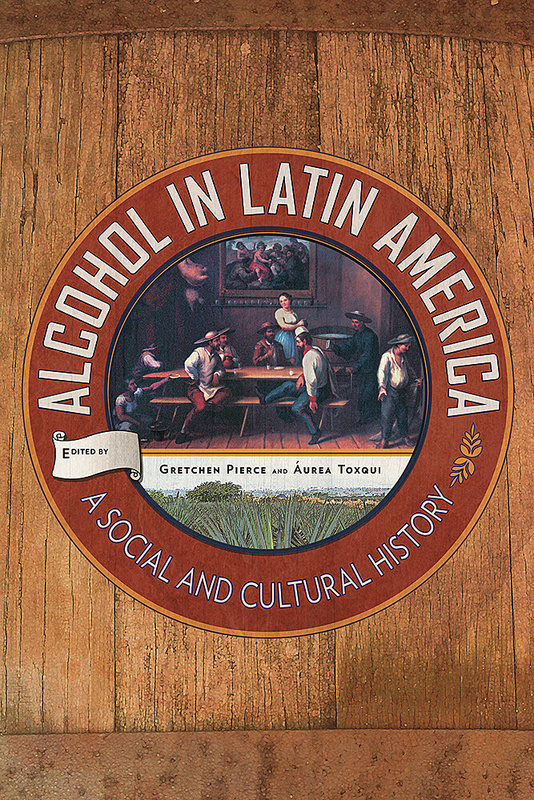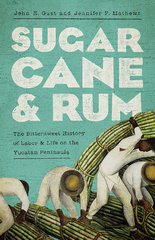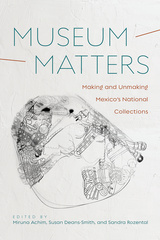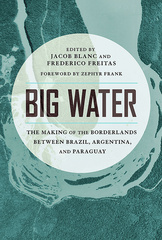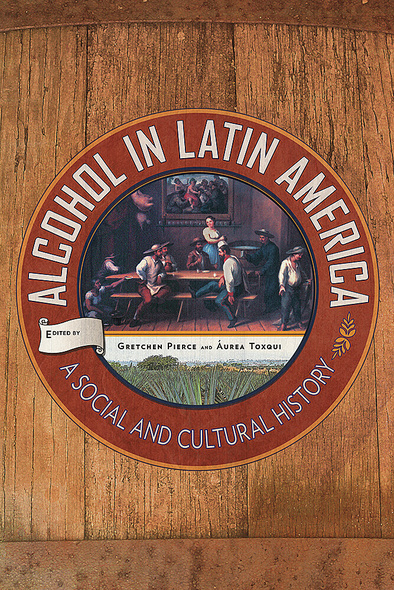
320 pages, 6 x 9
16 b&w illustrations, 1 map, 1 table
Paperback
Release Date:24 Jan 2017
ISBN:9780816536573
Alcohol in Latin America
A Social and Cultural History
Edited by Gretchen Pierce and Maria Áurea Toxqui
The University of Arizona Press
Aguardente, chicha, pulque, vino—no matter whether it’s distilled or fermented, alcohol either brings people together or pulls them apart. Alcohol in Latin America is a sweeping examination of the deep reasons why. This book takes an in-depth look at the social and cultural history of alcohol and its connection to larger processes in Latin America. Using a painting depicting a tavern as a metaphor, the authors explore the disparate groups and individuals imbibing as an introduction to their study. In so doing, they reveal how alcohol production, consumption, and regulation have been intertwined with the history of Latin America since the pre-Columbian era.
Alcohol in Latin America is the first interdisciplinary study to examine the historic role of alcohol across Latin America and over a broad time span. Six locations—the Andean region, Argentina, Brazil, Chile, Guatemala, and Mexico—are seen through the disciplines of anthropology, archaeology, art history, ethnohistory, history, and literature. Organized chronologically beginning with the pre-colonial era, it features five chapters on Mesoamerica and five on South America, each focusing on various aspects of a dozen different kinds of beverages.
An in-depth look at how alcohol use in Latin America can serve as a lens through which race, class, gender, and state-building, among other topics, can be better understood, Alcohol in Latin America shows the historic influence of alcohol production and consumption in the region and how it is intimately connected to the larger forces of history.
Alcohol in Latin America is the first interdisciplinary study to examine the historic role of alcohol across Latin America and over a broad time span. Six locations—the Andean region, Argentina, Brazil, Chile, Guatemala, and Mexico—are seen through the disciplines of anthropology, archaeology, art history, ethnohistory, history, and literature. Organized chronologically beginning with the pre-colonial era, it features five chapters on Mesoamerica and five on South America, each focusing on various aspects of a dozen different kinds of beverages.
An in-depth look at how alcohol use in Latin America can serve as a lens through which race, class, gender, and state-building, among other topics, can be better understood, Alcohol in Latin America shows the historic influence of alcohol production and consumption in the region and how it is intimately connected to the larger forces of history.
This expansive approach reveals several unifying themes and identifiable trends in recent scholarship on alcohol.’—Latin American Research Review
'Highly recommended.'—CHOICE
‘An engaging and illuminating volume that reveals a great deal about Latin American social, political, and economic life while also educating us about specific beverages and their meanings across time.’—Journal of Social History
‘The potent cocktail of essays served up by Gretchen Pierce and Áurea Toxqui both excite the senses and, at times, blur the vision.’—Latin American Review of Books
‘Engagingly written and meticulously researched.’—Bulletin of Latin American Research
‘[Alcohol in Latin America] should make essential reading, not just for those interested in the social and cultural history of Mexico and Latin America, but also for scholars and students of alcohol history and drinking studies more broadly.’—Food and History
‘The information in the book is valuable for a wide scope of research. For example, anyone interested in the nation-building processes of Latin America, women’s studies, independence efforts, temperance, or government control will find the collection useful.’—Studies in Latin American Popular Culture
‘This is a valuable text, full of insights on the centrality of alcohol in the lives of ordinary and non-ordinary
Spanish Americans over hundreds of years. It will serve as both reference to track available research on the subject and as useful reading in graduate and undergraduate surveys and specialized courses on social and cultural history.’—The Americas
‘This pioneering collection of essays will help shape a new field of historical research for Latin Americanists.’—David M. Fahey, editor of Alcohol and Drugs in North America: A Historical Encyclopedia
‘Alcohol in Latin America moves beyond the focus on the negative connected with alcohol consumption to examine the ways that everyday people understood alcohol consumption; how it tied them together; how it was tied to their local, regional, or newly emerging national identities; and the ways in which they used alcohol to resist oppression.’—Andrae M. Marak, co-author of At the Border of Empires: The Tohono O’odham, Gender, and Assimilation, 1880–1934
Gretchen Pierce is an assistant professor in the History Department at Shippensburg University in Shippensburg, Pennsylvania. She has contributed to The Social History of Alcohol andDrugs, A Companion to Mexican History and Culture, and Alcohol and Drugs in North America: A Historical Encyclopedia.
Áurea Toxqui is an assistant professor at Bradley University in Peoria, Illinois. She has published in The Growth of Non-Western Cities: Primary and Secondary Urban Networking, c. 900–1900 and Alcohol and Drugs in North America: A Historical Encyclopedia.
Áurea Toxqui is an assistant professor at Bradley University in Peoria, Illinois. She has published in The Growth of Non-Western Cities: Primary and Secondary Urban Networking, c. 900–1900 and Alcohol and Drugs in North America: A Historical Encyclopedia.
Acknowledgments
Introduction
Gretchen Pierce and Áurea Toxqui
Part 1. The Prehispanic and Colonial Periods
1. A Glass for the Gods and a Gift to My Neighbor: The Importance of Alcohol in the Pre-Columbian Andes
Justin Jennings
2. Liquid Fire: Alcohol, Identity, and Social Hierarchy in Colonial Brazil
Jjoão Azevedo Fernandes
3. Drunkenness and Interpersonal Violence in Colonial Michoacán
Aaron P. Althouse
Part 2. The Long Nineteenth Century (1820s to 1930)
4. Wine Country: The Vineyard as National Space in Nineteenth-Century Argentina
Nancy Hanway
5. Breadwinners or Entrepreneurs?: Women’s Involvement in the Pulquería World of Mexico City, 1850–1910
Áurea toxqui
6. Drunks and Dictators: Inebriation’s Gendered, Ethnic, and Class Components in Guatemala, 1898–1944
David Carey Jr.
Part 3. The Twentieth and Twenty-First Centuries
7. Pulqueros, Cerveceros, and Mezcaleros: Small Alcohol Producers and Popular Resistance to Mexico’s Anti-Alcohol Campaigns, 1910–1940
Gretchen Pierce
8. Tequila Sauza and the Redemption of Mexico’s Vital Fluids, 1873–1970
José Orozco
9. Essence and Identity: Transformations in Argentine Wine, 1880–2010
Steve Stein
10. Of Chicha, Majas, and Mingas: Hard Apple Cider and Local Solidarity in Twenty-First-Century Rural Southern Chile
Anton Daughters
Glossary
Bibliography
Contributors
Index

